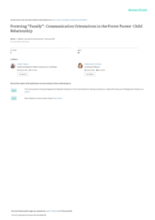Displaying 431 - 440 of 2168
This article presents the findings of the qualitative study on the personal change of foster parents carried out in Lithuania, which reveals the subjective experience of informal learning of the foster parents fostering a non-relative child.
The present study investigated the relationship of current foster parents’ communication with his/her foster child on foster parents’ perceptions of relational and child well-being.
In this pilot study, sixteen youth between ages 18 and 20 participated in semi-structured interviews, support mapping, and resiliency measurements to gather the experiences of the transition from foster care.
This study draws on data from the [STUDY] and the National Student Clearinghouse to examine the roles that Education and Training Vouchers (ETVs) and campus support programs (CSPs) play in promoting college persistence for foster youth.
This briefing provides information on two separate but related topics concerning looked after children in England: out of area and distant placements and unregulated and unregistered accommodation
This qualitative research explored the motivations and challenges of foster parents in Accra, Ghana.
The purpose of the present study was to examine differences in both internalized (e.g., worry and guilt) and externalized (e.g., anger and resentment) caregiver strain among biological, foster and adoptive caregivers, and assess the degree to which characteristics of the caregivers and the children in their care impact strain.
This article examines the distinctive campaign of foster carers to be recognised as workers, focusing upon the emergence of the campaign and the imaginative solidarities forged with seemingly disparate groups of precarious workers.
This study explores immigrant parents’ emotional experiences in child welfare services as well as parents’ emotional management and their interpretations of the role of emotions in the child welfare system.
The purpose of this study was to describe the demographics, state-dependent living situations, and juvenile detention usage of state-dependent commercially sexually exploited youth.



